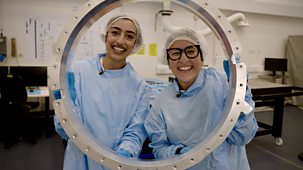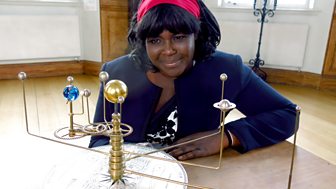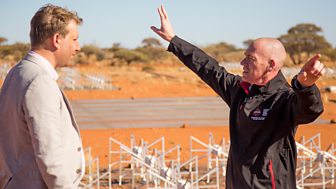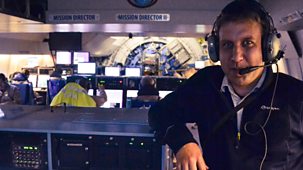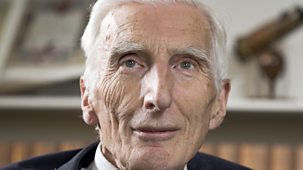
The Astronomer Royal at 80
Martin Rees is perhaps Britain’s most renowned cosmologist. He was master of Trinity College, Cambridge, president of both the Royal Astronomical Society and the Institute of Physics, and has led the nation’s foremost science institution, the Royal Society. Now, about to celebrate his eightieth birthday, Lord Rees talks to Chris Lintott about his career in science. \n\nLord Rees says he wasn’t particularly interested in the night sky as a child and only pursued science at school because he found languages difficult. He also regretted reading maths at Cambridge, only finding his stride during his postgraduate studies, when he was taken on by Dennis Sciama to undertake research in astrophysics, leading to his PhD. \n\nRees’s career spans what he calls a ‘golden age’ for astronomy. It began during a time when the origin of the universe was debated, when the flamboyant Fred Hoyle’s ‘steady state’ theory was eventually put to the sword by the bookish Martin Ryle, using the new technology of radio astronomy – in part aided and abetted by a young Martin Rees, whose work on quasars helped deal the fatal blow. \n\nRees was a contemporary of Stephen Hawking and witnessed at first hand the excitement of seeing black holes elevated from a speculative concept to an integral part of our universe’s evolution. Like many advances, including radio astronomy, it happened thanks to accidents in simultaneous progress. Work on radar during WWII led to advances in seeing the universe in non-visible wavelengths. Though they had been postulated in the 19th century, the reality of black holes arrived via Einstein’s theory of relativity, combined with radio astronomy and Roger Penrose’s genius for maths. \n\nTime and again, over Rees’s career, seemingly bizarre ideas in cosmology have turned out to have merit. Rees and his colleagues showed that ‘dark matter’ – a speculative ‘fix’ for inconsistencies in galaxy dynamics – is also essential to the understanding of how the early universe found form, giving the concept increased credibility. \n\nOne of science’s most celebrated thinkers and writers, Rees has never been shy of engaging with difficult concepts. While the ‘big bang’ solved the question of our origin story, it also raises other questions such as ‘what was there before the big bang?’, and Rees enjoys considering the possibility that there are other universes, perhaps with the properties of our universe that gave rise to us, or perhaps wholly or partially different. \n\nLord Rees also discusses the search for extraterrestrial intelligence, noting that while complex life may arise or has arisen in the universe, the likelihood is that, given the massive timescales involved, we are almost guaranteed to co-exist. But this leads to the intriguing prospect that any intelligent civilisation, including our own, is likely to create artificial intelligences that will supersede us and may well be near-immortal. \n\nWhile Lord Rees worries about the threats that AI and the misuse of technology poses to our civilisation, he sees a potentially bright future in terms of scientific discovery, citing international collaborations and technological advances that might see us answering some of the questions we consider today to be too difficult - like the start of the universe and black holes used to be not so long ago.
Source: BBC 4
Most recent episodes of The Sky at Night
The Sky At Night
Asteroid Strike?
The team explore one of the biggest stories in space news, the ‘city killer’ asteroid 2024 YR4. First observed on 27 December 2024, it soon became one of the biggest ...
17-04-2025
BBC 4
The Sky At Night
Ancestral Skies
This month, The Sky at Night teams up with BBC Ideas to discover the secrets of archaeology and astronomy and to reflect on our ancestral skies. \n\nThroughout history and acros ...
14-11-2024
BBC 4
The Sky At Night
Question Time Special
Get ready for The Sky at Night’s annual Question Time Special, where viewers get the opportunity to ask the questions they have always wanted answered about our universe.\ ...
08-10-2024
BBC 4
The Sky At Night
2075: Our Place In Space
The Sky at Night is embarking on a journey into the future as we explore how space will revolutionise life on Earth over the next 50 years. As humanity's reach extends into the ...
11-09-2024
BBC 4
The Sky At Night
Nicky, Nasa And The Next Frontier
In this Sky at Night special, the team talk to Dr Nicola Fox, NASA’s head of science, whose life began in the UK.\n\nPresenter Chris Lintott chats to Nicky about her early ...
15-08-2024
BBC 4
The Sky At Night
Webb Telescope: The Story So Far
In July 2022, the James Webb Space Telescope released its first images. They were visually stunning, and it was clear they provided more detail of stars, galaxies and planets th ...
11-07-2024
BBC 4
The Sky At Night
Cosmic Ghosts
This month, The Sky at Night has a spooky twist. Across the universe, there are hidden objects that we can’t see, but astronomers and scientists still believe they’r ...
13-06-2024
BBC 4
The Sky At Night
Hiding In Starlight
Total solar eclipses, like the one seen last month in North America, allow us to see details of the Sun that can’t be seen at any other time. So, this month, The Sky at Ni ...
16-05-2024
BBC 4
The Sky At Night
Space Rock Return
The Sky at Night is back for a brand new series, and this month it is delving into Nasa’s OSIRIS-REx mission, which last year brought back a sample from the near-Earth ast ...
11-04-2024
BBC 4
Most popular episodes of The Sky at Night
The Sky At Night
Asteroid Strike?
The team explore one of the biggest stories in space news, the ‘city killer’ asteroid 2024 YR4. First observed on 27 December 2024, it soon became one of the biggest ...
17-04-2025
BBC 4
The Sky At Night
The Sky At Day
The British weather is often the enemy of stargazers up and down the country. A forecast of a couple of hours of cloud cover will disappoint even the most determined amateur ast ...
13-07-2022
BBC 4
The Sky At Night
Outback Astronomy
In February 2018, news broke that astronomers had seen the cosmic dawn - the moment when stars first formed, flooding the universe with light. What's remarkable is that this inc ...
12-07-2018
BBC 4
The Sky At Night
Webb Telescope: The Story So Far
In July 2022, the James Webb Space Telescope released its first images. They were visually stunning, and it was clear they provided more detail of stars, galaxies and planets th ...
11-07-2024
BBC 4
The Sky At Night
Telescope On A Plane!
Telescope on a Plane!\n\nIn this special programme, the Sky at Night takes to the air on board the largest airborne observatory in the world – a specially modified jumbo j ...
09-12-2018
BBC 4
The Sky At Night
Space Rock Return
The Sky at Night is back for a brand new series, and this month it is delving into Nasa’s OSIRIS-REx mission, which last year brought back a sample from the near-Earth ast ...
11-04-2024
BBC 4
The Sky At Night
Pick Of The Year
Maggie Aderin-Pocock and Chris Lintott look back at some of the biggest stories featured on the programme in 2020, with the help of special guests who have chosen their favourit ...
20-01-2021
BBC 4
The Sky At Night
Guides: 3. Stars
For as long as humans have walked the Earth, the stars have fascinated us. But we have come a long way since the earliest days of astronomy when we had nothing but our eyes to o ...
09-01-2022
BBC 4
The Sky At Night
Mars: Red And Dead?
Maggie Aderin-Pocock and Chris Lintott reveal the latest results from Nasa's Curiosity and Esa's ExoMars TGO missions that are attempting to find signs of life on Mars. Maggie v ...
12-04-2018
BBC 4





